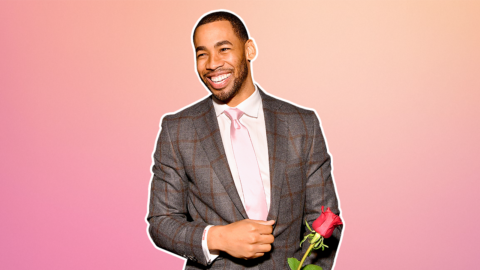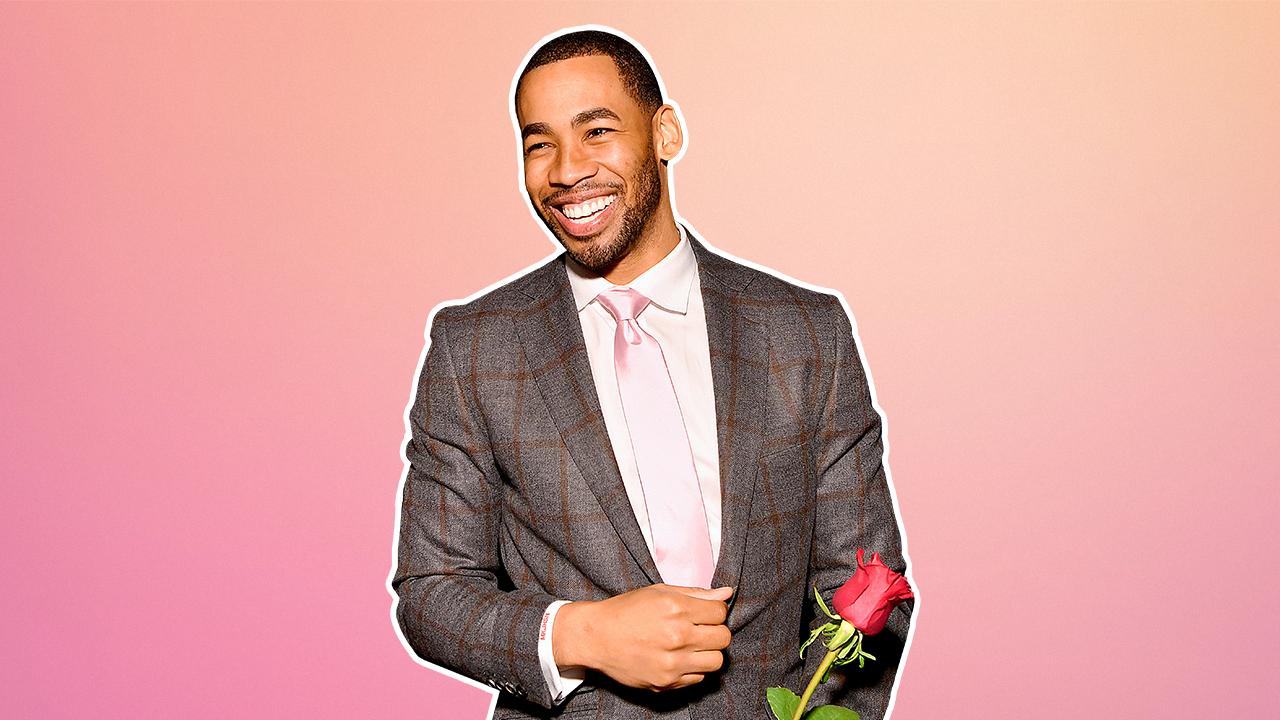The Bachelor Should 100% Cast a Black Lead—But That’s Not All
This shouldn't just be a one-time thing

We’re 40 seasons into all things Bachelor and Bachelor nation has had enough—of seeing the same type of people on their screens, that is. On June 8, a group of Bach fans banded together to announce the Bachelor Diversity Campaign, an initiative urging ABC and the franchise’s creators to diversify its casting and “consistently cast BIPOC (Black, Indigenous and people of color).” The campaign is currently circulating an online petition asking the franchise to cast a Black lead for season 25 of The Bachelor (ICYMI, the show 100% should have cast former contestant Mike Johnson as the lead in the most recent season of The Bachelor, but instead they gave us the milk dud that is Peter Weber), ensure that every future contestant pool be 35% non-white, and give equitable screen time to contestants of colour.
@ABCNetwork and @Fleissmeister you say you stand with the Black community—now take ACTION! 40 seasons is long enough. IT'S TIME. Show us you're anti-racist and cast a #BIPOCBachelor for Season 25. #BachelorSoWhite Sign our petition: https://t.co/74rezGjrMr
— Bachelor Diversity Campaign (@bachdiversity) June 8, 2020
This call for diversity really shouldn’t come as a surprise to anyone familiar with the hit franchise. Because for avid fans, two things are well-known: a) Bachelor Nation is cheesy as hell and b) it’s pretty much as white as the driven snow. In the show’s 40 seasons of casting for The Bachelor and The Bachelorette, there has been one POC as lead (season 18’s Juan Pablo Galavis) and one Black lead (season 13’s Rachel Lindsay). As Lindsay herself noted in a June 5 episode of AfterBuzz, this stat is *not* OK. “In 40 seasons [The Bachelor] had one Black lead,” Lindsay said. “We are on 45 presidents. And in 45 presidents there’s been one Black president. You are almost on par to say you’re more likely to become the President of the United States than you are a Black lead in this franchise. That’s insane. That’s ridiculous.”
And not to mention that in the rare instances that there is a BIPOC contestant on the show, they rarely make it very far (an issue that former director Ken Fuchs chalked up to the lead’s personal preferences in a March 2016 interview with The Hollywood Reporter). In 2012, the show faced a racial discrimination lawsuit, which stated that “the deliberate exclusion of people of color from the roles of the Bachelor and Bachelorette underscores the significant barriers that people of color continue to face in media and the broader marketplace.”
With the conversations happening right now around Black Lives Matter and anti-racism—spurred on by police brutality in the United States and Canada—it’s now more important than ever that one of the most popular television franchises in the world catch up to the times. Because what we see on screen *does* matter. As Bachelor alum and FLARE columnist Sharleen Joynt wrote in her June 9 recap of The Bachelor: The Greatest Seasons—Ever!: “Sure, it might be easy (or at least more convenient) to scoff off the role this franchise plays: should a largely fluffy reality show about finding love really be responsible for representing diversity? Frankly, yes, it should. I understand TV is a numbers game and all decisions are made with ratings in mind. However, with those ratings comes responsibility. With so many millions of eyeballs are watching, there comes a point where you are either working to fix the problem, or you’re a part of the problem.”
We’d 100% agree. And while the franchise does undoubtedly need to cast more Black leads, it shouldn’t stop there. Because there’s *a lot* more host Chris Harrison and the Bachelor powers that be have to do to ensure that their on-screen representation is authentic and impactful—and that doesn’t mean just casting one Black person and patting themselves on the back.
First of all, stop casting racist contestants
While it may seem like a *pretty* easy and honestly obvious ask, it turns out that for in Bachelor Nation, not casting contestants with racist viewpoints is kind of a difficult thing to do. During Rachel Lindsay’s season of The Bachelorette, the lead (who was the only Black lead in the show’s history) was forced to engage with a racist contestant. Two weeks into the season’s airing, racists tweets from contestant Lee Garrett surfaced online, including one that said: “What’s the difference between the NAACP and the KKK? Wait for it…One has the sense of shame to cover their racist as faces.”
Hooooooo boy! @BacheloretteABC @TheRachLindsay #TheBachelorette pic.twitter.com/cGMy6hFJh3
— Erika (@emesola) May 31, 2017
Other old tweets written by the Nashville musician a year or two before his time on the show called Black Lives Matter a “terrorist group.”
Gotta love how @BacheloretteABC casts Lee…wonder how @TheRachLindsay feels about it? #TheBachelorette pic.twitter.com/RX6lkGpgyB
— Erika (@emesola) May 31, 2017
While the tweets didn’t surface until *after* the show had already been filmed—and Lindsay had interacted with Garrett—it still calls into question the franchise’s vetting process. (It’s a process that has been scrutinized numerous times before). And while it’s incredible unfair and harmful to put anyone in a situation where they unknowingly have to interact with someone who believes racist ideologies, it’s 10 times more harmful considering that Lindsay is Black. Sure people change, but she should have at least been allowed to make the decision of whether or not she wanted to pursue a relationship with Garrett having been fully informed about who he was as a person.
And while producers say that they weren’t aware about Garrett’s past racist tweets, there’s no doubt that the franchise likes to garner a little buzz (good *or* bad), and would we really put it past them to cast a Black lead then just so happen to cast a contestant who thinks #AllLivesMatter and whose parents are ardent Trump supporters? I certainly wouldn’t. So seriously, check your vetting process Bachelor producers, and then cast contestants that would *actually* be a good—and non-racist—match for the lead.
Don’t leave it up to the Bachelor leads to educate contestants—and audiences—about racism
And while the franchise may cast a Black lead, it’s important that, in doing so, they make sure that they’re not leaving it up to said lead to educate people on racism—both on-screen and IRL. Take Lindsay, for example. First of all, this lady is *way* too smart for this franchise—and she 100% knows it. Since her time on the show, Lindsay has done the incredibly hard work of educating those in Bachelor nation about systemic racism, often using her own experiences and the hate spewed at her to do so. In March 2020, she appeared on the season 24 episode of The Women Tell All in a special segment about online bullying, highlighting the racism and hate she deals with for being a Black woman in the public eye. It was a jarring segment, as Lindsay read out several hate-filled messages she had received. While the show’s intention was surely good, it really should not be up to Lindsay to put in the emotional labour of educating people about racism by sharing the traumatic personal attacks she’s endured.
Lindsay had to do this once again in May, after season 15 Bachelorette Hannah Brown used the N-word while singing a song on Instagram Live, before denying she said it and then issuing an apology.
In response to Brown’s video, Lindsay posted an IGTV video in which she said she was “personally offended” by Brown’s use of the word. The video also talked at length about why non-Black people shouldn’t use the N-word (which is honestly something people should know by now).
In later interviews, Lindsay said that she’d also personally spoken to Brown on the phone. Which is an incredibly nice thing of her to do, but she shouldn’t have to do this education herself. And neither should future leads. While it’s inevitable and important that discussions around race—especially in our current political climate—arise, BIPOC people should not continuously be doing the work of enlightening uneducated people on racism. There are so many resources available!
So please Bach producers, don’t give us a group date where the contestants have to illustrate anti-racism through an interpretive dance with Amy Schumer judging.
The Bachelor needs to diversify behind the scenes as well
While it’s tough to gauge the diversity of a team as big as the one it takes to churn out season after season of The Bachelor and Bachelorette, it’s not hard to believe that, were there more diversity behind the scenes, it might translate into better diversity on the screen. The show is hosted and created by white men (Chris Harrison and Mike Fleiss, respectively), and a quick scan of a handful of the show’s most recent executive producers (Nicole Woods, Bennett S. Graebner, Elan Gale and Peter Gust) shows a lack of diversity BTS. This would be a great opportunity to branch out and hire producers and executives from different backgrounds who can bring a variety of perspectives and experiences to the show. It has been 40 season after all, don’t we think it’s time for a bit of a change?
And don’t just make this a one-off stunt
Last but not least, just because they may cast a Black lead for season 25 of The Bachelor *doesn’t* mean that their work is done. Far from it. As many folks have pointed out online and via the campaign, this call for diversity is just the start. Audiences shouldn’t have to wait every 15 seasons to have a BIPOC lead. So, cast more BIPOC people! If I go another 40 seasons without seeing another jar of mayonnaise from California, I’ll be very happy.
Now, the only thing left to do? Cast Mike Johnson as the next Bachelor, you cowards!









